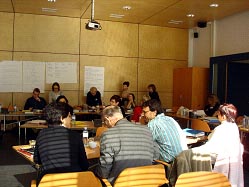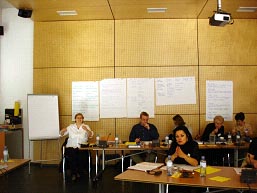 |
||||||||||||||||||
 |
|
|||||||||||||||||
| | Results | | The Project | | Materials | | Milestones | | Français | | Deutsch | | ||||||||||||||||||
|
October 2006: QualiTraining Workshop
Following a preparatory meeting on 11 October, the Qualitraining team led the central workshop for the project from 12 - 14 October, 2006 at the ECML in Graz. Laura Muresan, Project Co-ordinator, and Adrian Butler, Executive Director of the ECML, opened the workshop and welcomed the participants from 28 different countries: Andorra, Armenia, Austria, Bosnia and Herzegovina, Bulgaria, Cyprus, Czech Republic, Estonia, Finland, France, Germany, Greece, Hungary, Iceland, Japan, Latvia, Lithuania, Malta, The Netherlands, Norway, "the Former Yugoslav Republic of Macedonia", Romania, the Russian Federation, Slovenia, Spain, Sweden, Switzerland, United Kingdom. Laura Muresan, supported by Frank Heyworth, Galya Mateva and Mary Rose, outlined the themes for the workshop and the role of participants in shaping the final revision of the Guide. The outcomes from the pre-workshop task, which had been devised to help participants relate the theme of the workshop to their professional environment, showed a great deal of commonality in the factors which affect the development of quality. The workshop programme had been designed to allow each day to begin with examples of practice; case studies which exemplified the theory and the concepts developed in each unit of the Guide. This was followed by input on the main themes of the units, led each time by each unit's author and mediated through selected activities from the Guide or related tasks. The case studies had been contributed by Michel Boiron [France], Phil Dahl [United Kingdom], Svetla Dimitrova and Svetla Tashevska [Bulgaria], Stephen Hughes [Spain], Birigitte Ortner [Austria] and David Turrell [United Kingdom]. David Turrell attended the Central Workshop and presented his case study in two parts:
Feedback was gathered through plenary sessions and in both oral and written form. All participants completed the extensive evaluation sheets on the last day of the workshop. 
WORKSHOP PROGRAMME
Day 2 - Quality and People
Day 3 - Systems, Processes and Instruments for Quality Management
At the end of each day participants were invited to identify positive and negative aspects of the day and those items, their 'wishes', that they wanted to raise. The programme for the following day was refined further in response to this review.  Evaluating the Guide In conclusion The willingness of all participants to discuss practice and share ideas openly was critical to the success of the workshop. The workshop atmosphere was characterised by warm, supportive relationships, questioning, debating and humorous exchanges; this atmosphere was further enhanced by the beautiful autumn sunshine in Graz throughout the workshop, the helpfulness of the ECML staff and the pleasant social evenings participants spent together. Mary Rose
September 2006: QualiTraining Preparatory meeting The QualiTraining project - which is producing a training guide for the development of quality assurance in language education - is approaching its final stages. The project team - Laura Muresan, the coordinator, Galya Mateva, Mary Rose and Frank Heyworth - met in Graz on September 1st and 2nd to plan the Central Workshop which will be held in October. The draft of the Guide is almost finished and it will be complemented by case studies from experts who have been involved in the project; it is planned to include more case studies provided by participants in the workshop and these will be on the CD-ROM which will accompany the 60-page guide. The three days of the workshop will each have a theme:
The Guide will be available in English and German in Spring 2007, and can be used by individuals or as the basis of training events.
March 2006: QualiTraining Expert Meeting The QualiTraining team met in Graz with a group of invited experts in order to carry out further consultations on the Training Guide and its draft contents. The experts were drawn from the two regional workshops held in Bath (UK) and Sofia (Bulgaria) in 2005. This group included Phil Dahl (UK), Svetla Dimitrova (Bulgaria), Steve Hughes (Spain) and David Turrell (UK). In addition, the team was joined by Brigitte Ortner (Austria), General Manager, Österreich Institut, and Michel Boiron (France), Director of CAVILAM. Adrian Butler, Executive Director of the ECML, welcomed everyone and provided an introductory overview of the mission and work of the ECML. Through team plenaries and small group discussions, the group was able to analyse the project outcomes to date and to refine the draft of the QualiTraining Guide. It was a most helpful two days, with the visiting experts making a significant contribution to the shaping of the Guide through their responses and suggestions and also giving short presentations on the application of quality assurance principles and processes in their own institutions and contexts. It was much appreciated that the participants have agreed to record these experiences in case studies for the Guide. Susanna Slivensky, Michael Armstrong and Michèle
Bergdoll of the ECML staff also participated at different points during
the meeting.
December 2005: QualiTraining Regional event in Sofia, Bulgaria The second QualiTraining regional event took place
between 8-10 December in Sofia, Bulgaria. The detailed report is available
under Materials. This workshop, which was the first ECML regional event to be held in the UK, took place at the International Learning and Research Centre on the premises of the Sir Bernard Lovell School from Thursday 6 October to Saturday 8 October 2005. Objectives of the seminar
October 2004 and January 2005: Team meeting reports In their last two meetings (in October 2004 and in January 2005), the project team worked on the content and structure of the proposed "QualiTraining" Guide and decided that the emphasis should be on how to implement quality approaches to language education, rather than on the content of quality management systems (which are already comprehensively covered in the CD-ROM produced in the 1st MTP).
The project team would be glad to receive your comments about the guide. Please contact the project coordinator. The overall design of the Guide is planned as follows:
List of issues to be addressed in the 5 main
sections of the Guide:
February 2004: Team meeting report The initial meeting of the project team, led by Laura Muresan, was held at the ECML, Graz on 13 and 14 February 2004. Project objectives were finetuned and a project plan was mapped out. During the two days discussions were held with Elke Resch, ECML webmaster, Perrine Lamacq, ECML translation and terminology assistant and Josef Huber, Deputy Director and Director of Programmes. Project Team Co-ordinator Project Team The overall aim of the project is to work towards consolidating a quality assurance culture in language education across Europe and beyond through
Key Milestones during the first stage of the project journey
The Heart of the Matter - the Quality Guide
Using a range of contributors |
||||||||||||||||||